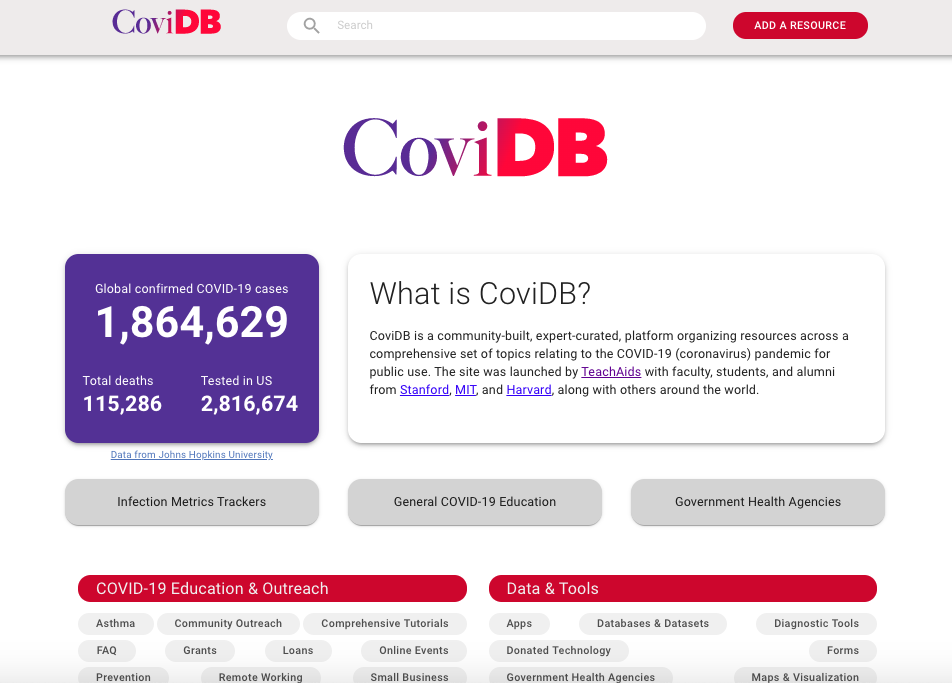Stanford students and researchers have created a global wiki-style website for community-built, expert-reviewed coronavirus resources.
The website, CoviDB — a collaboration with the educational nonprofit TeachAids and students at colleges across America — collates global sources addressing topics ranging from public health to culture and sports in the wake of the pandemic.
CoviDB is the expansion of an initial local effort, the Stanford Mutual Aid Student Support Site, which debuted earlier this month as a centralized forum for Stanford-specific COVID-19 resources.
“We first got involved with Stanford Mutual Aid when we found a couple community resource sharing spreadsheets circulating around campus,” wrote Elena Mosse ’21 and Shravya Gurrapu ’20, speaking on behalf of the Stanford students and TeachAids fellows involved in the project. “Amidst a time when we were all feeling lost and confused, we were immediately encouraged by seeing members of the Stanford community offering everything and anything they could to help one another.”
According to Mosse and Gurrapu, after recognizing that all of these resources were helpful but scattered, they worked with other Stanford undergraduates, graduate students. postdocs, alumni and faculty members to formulate the Stanford Mutual Aid Site. The site consolidates Stanford updates, initiatives and resources including administrative announcements, housing and financial support options, transportation offerings and mental health resources.
After the launch of the Stanford Mutual Aid Site, the team realized that its local efforts could be expanded on a global scale, Mosse and Gurrapu wrote.
“Local communities have a critical role to play in solving their health challenges,” wrote TeachAids advisor Anurag Mairal. “COVID-19, the most widespread health crisis to hit the world in 100 years, has ironically created a necessity and opportunity to do so.”
Several of the students involved with the initial project had worked closely with TeachAids, a global nonprofit founded out of Stanford in 2009 that “creates technology to solve persistent problems in health education around the world,” according to the organization’s website. The students reached out to advisors at TeachAids and joined forces with the organization to create CoviDB,.
“Especially given TeachAids’ network of international expert advisors, we are able to collect and present accurate and vetted information from around the globe in a time when misinformation is growing and accurate information is often challenging to parse and find,” Mosse and Gurrapu wrote.
CoviDB was conceived, built and launched in one week, as Stanford affiliates, TeachAids fellows and students and alumni from colleges such as Harvard and MIT worked remotely in order to maintain social distancing. According to TeachAids Founder and CEO Piya Sorcar, the site is made for a range of users, including young adults, educators, epidemiologists and journalists.
“We looked to our mission — to provide access to lifesaving health educational materials to as many people as possible — and the students took off running,” Sorcar wrote. “We worked day and night to build a useful tool as quickly as possible for this urgent issue.”
The project aims to provide people with important coronavirus information from credible sources, its founders stressed.
“We hope that CoviDB can provide a one-stop shop for accurate information that people around the world are looking for on a variety of COVID-19 topics,” Mosse and Gurrapu wrote. “Especially given the fact that COVID-19 impacts everyone’s life across multiple different dimensions and aspects, we believe that this site can serve as a trusted starting point for anyone who is looking to gain information about coronavirus.”
According to Sorcar, CoviDB’s sources are reviewed by researchers and educators from around the world.
“We hope that CoviDB can play a role in easing the burden of keeping you and your family safe,” Sorcar wrote.
TeachAids advisors affiliated with Stanford and involved with the launch of CoviDB include Shelley Goldman, professor and associate dean of Students and Faculty Affairs, and David Katzenstein, professor emeritus of infectious diseases.
“Although the COVID-19 situation is continuing to escalate, we have the opportunity to slow down the spread of misinformation via CoviDB.org,” Goldman wrote. “Knowledge is our first line of defense against a global pandemic, and this educational platform can serve as a model as we look towards the future of epidemiology in the information age.”
“Education is the best tool we have to keep our planet safe,” Katzenstein added.
Mairal wrote that CoviDB also strives to provide people who want to help during the pandemic with the platform to share and publicize their resources. Groups can fill out a form which is linked at the bottom of the site in order to add a resource to CoviDB.
“Providing an accessible, easy-to-use repository of data and insights about COVID-19 is an important way to enable these communities of innovators who are jumping in to create solutions for their people, while collaborating with global partners,” he told The Daily.
Going forward, the CoviDB team hopes to continue to expand the platform to adapt to the evolving needs of communities affected by the pandemic.
“As it grows and users contribute new resources to the site, our hope is that CoviDB will begin to address information and resource needs we could not have anticipated, meeting more niche and recently-developed needs,” Mosse and Gurrapu wrote. “We hope that this growth will further help foster a sense of community and connectedness with users contributing to the platform and sharing information in an organic way.”
Contact Sarina Deb at sdeb7 ‘at’ stanford.edu.
